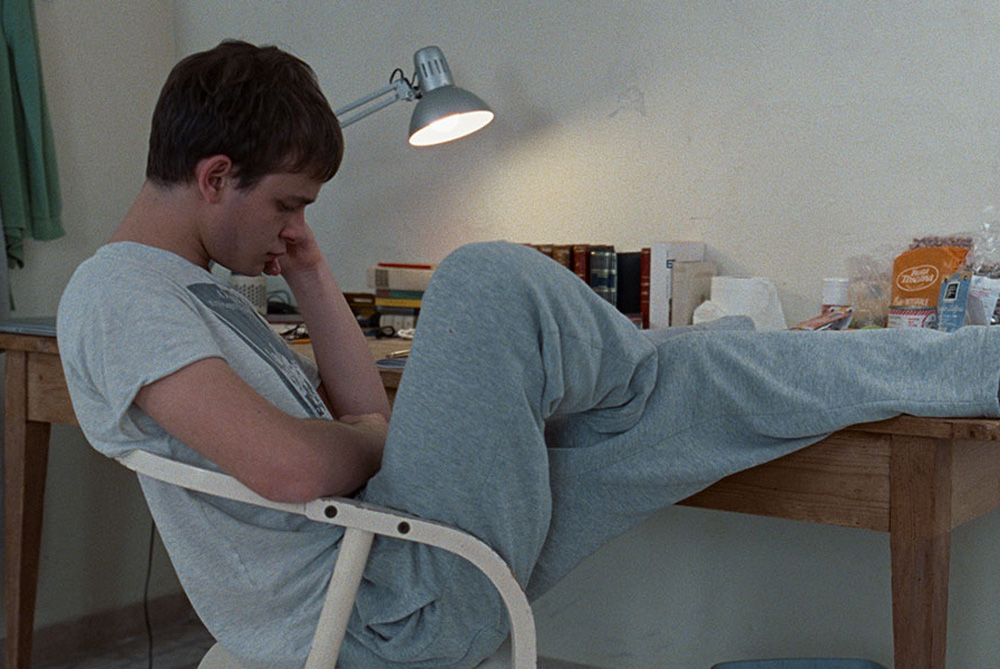“You have weak capillaries,” Leonardo’s mother tell him as she’s giving him a ride to the airport in “Diciannove (Nineteen),” after the young man (Manfredi Marini) has suffered a nosebleed and she’s none too concerned about it. She worries about other things as he plans to study abroad, leaving his hometown of Palermo to join his sister Arianna (Vittoria Planeta) in London with plans to become an economics major – she finds it odd that he decided to keep in Arianna’s room before leaving rather than his own, though he insisted the bathroom’s closer – and her fears don’t seem entirely off-base when nearly as soon as he arrives in England, he looks the part of a college bohemian, but in Giovanni Tortorici’s dazzling directorial debut, you realize he couldn’t be any more uncomfortable in his own skin.
Tororici makes “Diciannove” a full body experience when celluloid is meant to mirror Leonardo’s epidermis, with the acolyte of Luca Guadagnino, who serves as a producer on the film after the first-time writer/director was an assistant director on his HBO series “We Are Who We Are,” clearly indulging in the same formal playfulness as the “Challengers” director when the film is filled with loopy camera tricks to see the world as the teen does, confused about social interaction, headstrong in the opinions he does hold dear and more than a little horny. You never know how or when one of these quirks will show up, but it’s clear that even before seeing Leonardo puke his guts out on the bus on the way back home from a night of heavy drinking with Arianna and her friend Giulia and making out with randos on the dance floor, the carefree uni lifestyle isn’t going to sit well with him for various reasons.
Soon enough, Leonardo moves out of Arianna’s apartment and switches up majors, drawn to pre 20th century Italian literature for reasons only he could know, but the search for an identity is what will make a great deal of sense to those watching as only trial and error will lead to him figuring out a way forward he can live with. It may be extreme to mix “Justin Bieber dick pics” into Google searches of “Giacomo Leopardi letters,” but Tororici has a strong handle on such an uncertain age where bizarre ideas take hold without a proper frame of reference and the sudden access to adult pastimes doesn’t actually mean you’ve become any more mature. If it weren’t for the wi-fi access that Leonardo depends upon, the film would feel timeless, particularly when he starts settling into the humble pleasures of reading after he’s procured books from eBay and Marini, in an engaging turn, allows you to see him start to develop his own way of thinking with no more than a glance.
However, “Diciannove” seems particularly in tune with not only this moment in Leonardo’s life, but in all of ours when seeking refuge in the classics can also appear to be a way to obstruct progress. Although the film isn’t overtly political, it isn’t as much of a reach as one might think to see it as the origin story of a future fascist like wunderkind Trump advisor Stephen Miller, unable to keep up with contemporary culture and deciding he’d rather be part of a much smaller world where he’d ideally have more control over his own destiny and conformity rules the day. In this regard, Tororici finds a perfect ending when things can’t possibly be resolved any time soon for Leonardo at only the start of a new chapter, but the director shows the wisdom to somehow call him out on his youthful pretensions and one can only hope Leonardo leans into his eccentricities rather than run away from them. “Diciannove” becomes its own proof of how well that can work out.
“Diciannove” does not have U.S. distribution.




